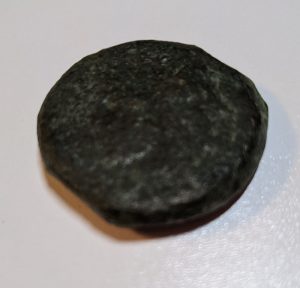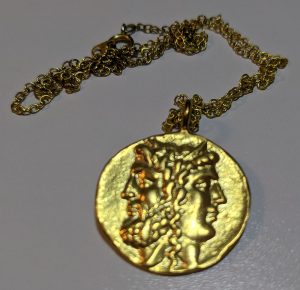January Baby – Symbolism in Against the Glass
January, the first month of the Gregorian calendar, the calendar we use, is named for the ancient Roman god, Janus. The Romans minted coins in his honor, as we honor people today with stamps and coins. The faces are barely visible on the large, weathered, authentic two-thousand-year-old coin pictured here. Also pictured is a reproduction, clearly showing the faces.
There are variations of these Janus coins, but most depict two faces looking in opposite directions. This is one theme in Against the Glass. On a personal level, as much as Candace wants to move forward with her life, the past rises up to haunt her and pull her down. With regard to the social or political commentary of the novel, activists for women’s rights have looked back to the first wave of feminism, which secured women the right to vote in 1920. The second wave strives to give women other rights, choices, and freedoms to make them equal. Looking back, looking forward. Water being fluid, there are other waves.
The ancient Roman god, Janus, is also the god of all beginnings, whether it’s the planting season, or any big endeavor. He is the beginning of new life phases, new milestones, therefore, the god of all transitions. In the novel, Candace has to build her life anew and stands at doors or gates, through which she must pass. There are many symbolic double doors, gateways, and thresholds in the novel.
Most importantly to the novel, Janus is also the god of birth, protecting the doors of life, through which all of us must pass, unless born via cesarean. In Against the Glass, Candace is a January baby. In her family, it is an unbroken thousand-year-old family tradition that the ancient Roman Janus coin be passed down, generation to generation, along with oral lore, to the first January baby girl born in any year. It is her turn, as the last female in the family line, to pass the coin to her January baby and continue the tradition and the family.
Janus is also the god of endings and time.

